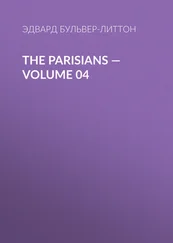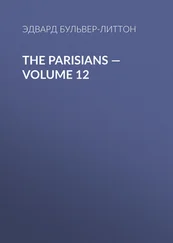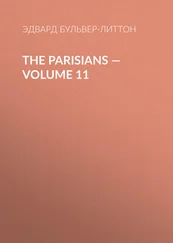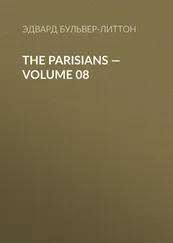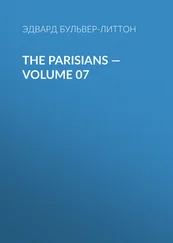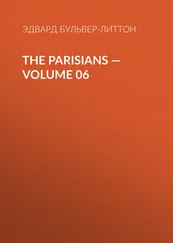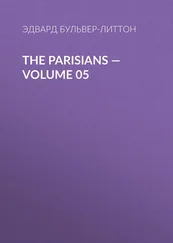Эдвард Бульвер-Литтон - The Parisians — Complete
Здесь есть возможность читать онлайн «Эдвард Бульвер-Литтон - The Parisians — Complete» — ознакомительный отрывок электронной книги совершенно бесплатно, а после прочтения отрывка купить полную версию. В некоторых случаях можно слушать аудио, скачать через торрент в формате fb2 и присутствует краткое содержание. Жанр: foreign_prose, literature_19, Европейская старинная литература, foreign_antique, на английском языке. Описание произведения, (предисловие) а так же отзывы посетителей доступны на портале библиотеки ЛибКат.
- Название:The Parisians — Complete
- Автор:
- Жанр:
- Год:неизвестен
- ISBN:нет данных
- Рейтинг книги:5 / 5. Голосов: 1
-
Избранное:Добавить в избранное
- Отзывы:
-
Ваша оценка:
- 100
- 1
- 2
- 3
- 4
- 5
The Parisians — Complete: краткое содержание, описание и аннотация
Предлагаем к чтению аннотацию, описание, краткое содержание или предисловие (зависит от того, что написал сам автор книги «The Parisians — Complete»). Если вы не нашли необходимую информацию о книге — напишите в комментариях, мы постараемся отыскать её.
The Parisians — Complete — читать онлайн ознакомительный отрывок
Ниже представлен текст книги, разбитый по страницам. Система сохранения места последней прочитанной страницы, позволяет с удобством читать онлайн бесплатно книгу «The Parisians — Complete», без необходимости каждый раз заново искать на чём Вы остановились. Поставьте закладку, и сможете в любой момент перейти на страницу, на которой закончили чтение.
Интервал:
Закладка:
“Then, Signorina, you are forbidden to undervalue the gift of song. You must feel its power over the heart, when you enter the opera-house; over the soul, when you kneel in a cathedral.”
“Oh,” cried Isaura, with enthusiasm, a rich glow mantling over her lovely face, “how I thank you! Is it you who say you do not love music? How much better you understand it than I did till this moment!”
Here Mrs. Morley, joined by the American poet, came to the corner in which the Englishman and the singer had niched themselves. The poet began to talk, the other guests gathered round, and every one listened reverentially till the party broke up. Colonel Morley handed Isaura to her carriage; the she-mountebank again fell to the lot of Graham.
“Signor,” said she, as he respectfully placed her shawl round her scarlet-and-gilt jacket, “are we so far from Paris that you cannot spare the time to call? My child does not sing in public, but at home you can hear her. It is not every woman’s voice that is sweetest at home.”
Graham bowed, and said he would call on the morrow. Isaura mused in silent delight over the words which had so extolled the art of the singer. Alas, poor child! she could not guess that in those words, reconciling her to the profession of the stage, the speaker was pleading against his own heart.
There was in Graham’s nature, as I think it commonly is in that of most true orators, a wonderful degree of intellectual conscience which impelled him to acknowledge the benignant influences of song, and to set before the young singer the noblest incentives to the profession to which he deemed her assuredly destined; but in so doing he must have felt that he was widening the gulf between her life and his own. Perhaps he wished to widen it in proportion as he dreaded to listen to any voice in his heart which asked if the gulf might not be overleapt.
CHAPTER II
ON the morrow Graham called at the villa at A———. The two ladies received him in Isaura’s chosen sitting-room.
Somehow or other, conversation at first languished. Graham was reserved and distant, Isaura shy and embarrassed. The Venosta had the frais of making talk to herself. Probably at another time Graham would have been amused and interested in the observation of a character new to him, and thoroughly southern,—lovable not more from its naive simplicity of kindliness than from various little foibles and vanities, all of which were harmless, and some of them endearing as those of a child whom it is easy to make happy, and whom it seems so cruel to pain; and with all the Venosta’s deviations from the polished and tranquil good taste of the beau monde, she had that indescribable grace which rarely deserts a Florentine, so that you might call her odd but not vulgar; while, though uneducated, except in the way of her old profession, and never having troubled herself to read anything but a libretto and the pious books commended to her by her confessor, the artless babble of her talk every now and then flashed out with a quaint humour, lighting up terse fragments of the old Italian wisdom which had mysteriously embedded themselves in the groundwork of her mind.
But Graham was not at this time disposed to judge the poor Venosta kindly or fairly. Isaura had taken high rank in his thoughts. He felt an impatient resentment mingled with anxiety and compassionate tenderness at a companionship which seemed to him derogatory to the position he would have assigned to a creature so gifted, and unsafe as a guide amidst the perils and trials to which the youth, the beauty, and the destined profession of Isaura were exposed. Like most Englishmen—especially Englishmen wise in the knowledge of life—he held in fastidious regard the proprieties and conventions by which the dignity of woman is fenced round; and of those proprieties and conventions the Venosta naturally appeared to him a very unsatisfactory guardian and representative.
Happily unconscious of these hostile prepossessions, the elder Signora chatted on very gayly to the visitor. She was in excellent spirits; people had been very civil to her both at Colonel Morley’s and M. Louvier’s. The American Minister had praised the scarlet jacket. She was convinced she had made a sensation two nights running. When the amour propre is pleased, the tongue is freed.
The Venosta ran on in praise of Paris and the Parisians; of Louvier and his soiree and the pistachio ice; of the Americans, and a certain creme de maraschino which she hoped the Signor Inglese had not failed to taste,—the creme de maraschino led her thoughts back to Italy. Then she grew mournful. How she missed the native beau ciel! Paris was pleasant, but how absurd to call it “le Paradis des Femmes,”—as if les Femmes could find Paradise in a brouillard!
“But,” she exclaimed, with vivacity of voice and gesticulation, “the Signor does not come to hear the parrot talk; he is engaged to come that he may hear the nightingale sing. A drop of honey attracts the fly more than a bottle of vinegar.”
Graham could not help smiling at this adage. “I submit,” said he, “to your comparison as regards myself; but certainly anything less like a bottle of vinegar than your amiable conversation I cannot well conceive. However, the metaphor apart, I scarcely know how I dare ask Mademoiselle to sing after the confession I made to her last night.”
“What confession?” asked the Venosta.
“That I know nothing of music and doubt if I can honestly say that I am fond of it.”
“Not fond of music! Impossible! You slander yourself. He who loves not music would have a dull time of it in heaven. But you are English, and perhaps have only heard the music of your own country. Bad, very bad—a heretic’s music! Now listen.”
Seating herself at the piano, she began an air from the “Lucia,” crying out to Isaura to come and sing to her accompaniment.
“Do you really wish it?” asked Isaura of Graham, fixing on him questioning, timid eyes.
“I cannot say how much I wish to hear you.”
Isaura moved to the instrument, and Graham stood behind her. Perhaps he felt that he should judge more impartially of her voice if not subjected to the charm of her face.
But the first note of the voice held him spell-bound. In itself the organ was of the rarest order, mellow and rich, but so soft that its power was lost in its sweetness, and so exquisitely fresh in every note.
But the singer’s charm was less in voice than in feeling; she conveyed to the listener so much more than was said by the words, or even implied by the music. Her song in this caught the art of the painter who impresses the mind with the consciousness of a something which the eye cannot detect on the canvas.
She seemed to breathe out from the depths of her heart the intense pathos of the original romance, so far exceeding that of the opera,-the human tenderness, the mystic terror of a tragic love-tale more solemn in its sweetness than that of Verona.
When her voice died away no applause came,—not even a murmur. Isaura bashfully turned round to steal a glance at her silent listener, and beheld moistened eyes and quivering lips. At that moment she was reconciled to her art. Graham rose abruptly and walked to the window.
“Do you doubt now if you are fond of music?” cried the Venosta.
“This is more than music,” answered Graham, still with averted face. Then, after a short pause, he approached Isaura, and said, with a melancholy half-smile,—
“I do not think, Mademoiselle, that I could dare to hear you often; it would take me too far from the hard real world: and he who would not be left behindhand on the road that he must journey cannot indulge frequent excursions into fairyland.”
“Yet,” said Isaura, in a tone yet sadder, “I was told in my childhood, by one whose genius gives authority to her words, that beside the real world lies the ideal. The real world then seemed rough to me. ‘Escape,’ said my counsellor, ‘is granted from that stony thoroughfare into the fields beyond its formal hedgerows. The ideal world has its sorrows, but it never admits despair.’ That counsel then, methought, decided my choice of life. I know not now if it has done so.”
Читать дальшеИнтервал:
Закладка:
Похожие книги на «The Parisians — Complete»
Представляем Вашему вниманию похожие книги на «The Parisians — Complete» списком для выбора. Мы отобрали схожую по названию и смыслу литературу в надежде предоставить читателям больше вариантов отыскать новые, интересные, ещё непрочитанные произведения.
Обсуждение, отзывы о книге «The Parisians — Complete» и просто собственные мнения читателей. Оставьте ваши комментарии, напишите, что Вы думаете о произведении, его смысле или главных героях. Укажите что конкретно понравилось, а что нет, и почему Вы так считаете.

